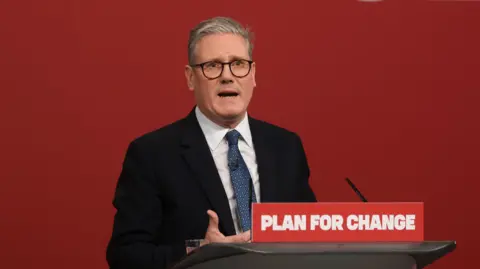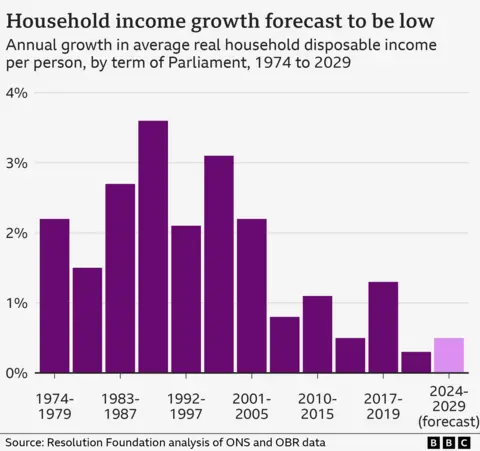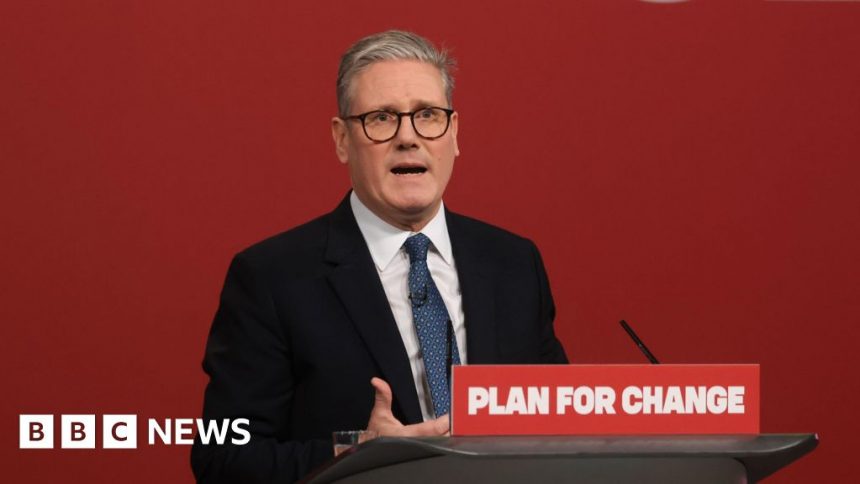Starmer makes new pledges on living standards and NHS
 EPA
EPASir Keir Starmer has set out new pledges on improving living standards and cutting NHS waiting times in a major speech.
The prime minister said his “plan for change”, which included six targets covering the economy, housebuilding, the health service, policing and pre-school education, would “give the British people the power to hold our feet to the fire”.
He described the plan as “ambitious”, saying it would be “an almighty challenge” to hit the targets over the next five years.
However, the Conservatives criticised Sir Keir for not including a “concrete” target on immigration and accused him of watering down a previous promise on decarbonising the electricity grid.
The targets – which the government is calling “milestones” – give more detail about how Labour plans to achieve the five “missions” set out in its election manifesto.
The six “milestones”, which the government is aiming to meet by 2029 when the next election is likely to be held, are:
- raising living standards in every part of the UK, as part of the government’s aim to deliver the highest sustained economic growth in the G7 group of rich nations
- building 1.5 million homes in England and fast-tracking planning decisions on at least 150 major infrastructure projects
- ending hospital backlogs to meet the NHS target that 92% of patients in England wait no longer than 18 weeks for planned treatment
- a named police officer for every neighbourhood in England and Wales, with the recruitment of 13,000 additional officers, Police Community Support Officers (PCSOs) and special constables
- increasing the proportion of children in England who are “ready to learn” when they start school at the age of five, to 75%
- putting the country on track for at least 95% clean power by 2030
Some of the pledges, including to recruit more police officers and build 1.5 million homes, restate existing commitments.
However, they highlight the areas the government wants to prioritise in the coming years.
The also seek to communicate to voters how they would personally benefit from a Labour government.
While an aim to secure the highest sustained economic growth in the G7 remains, there is now also a target to raise living standards.
However, the government’s plan does not put a specific numerical target on this, only stating that it will be measured through higher real household disposable income (RHDI) and GDP per capita in every region of the UK.
RHDI is what people have left of their pay and benefits once they have paid tax, while GDP is a measure of the size of the economy

Sir Keir faced criticism from both the Conservatives and Reform UK for not including a milestone on migration, with Tory leader Kemi Badenoch claiming the government had “no plan to control numbers”.
In his speech, the PM said the government would reduce both legal and illegal, without giving numbers.
Taking questions from journalists after, the PM insisted he was not deprioritising the issue but said putting an “arbitrary” cap on migration did not work under the Conservatives.
He said the government had a “serious plan” to get the numbers down, including tackling the smuggling gangs behind small boat crossings.
Sir Keir added that border security was a a “foundational principle” that any government must deliver, while his missions were “on top of that”.
He also denied watering down his party’s previous commitment on green energy.
Labour’s election manifesto promised “zero-carbon electricity by 2030”, while his new milestone sets a target of “at least 95%”.
“In terms of where we need to get to on clean energy by 2030, it’s exactly the same as it always was,” Sir Keir said.
“There’s always going to be a mix but that is the pledge that we made two years ago. “
Badenoch described the speech as an “emergency reset”, which “confirms that Labour had 14 years in opposition and still weren’t ready for government”.
Liberal Democrat leader Sir Ed Davey said “people want real change instead of a government simply moving the goalposts”.
He said it was “worrying” there was no clear plan on how to ensure people could see a GP when they needed to, adding: “Pledging to bring down waiting lists while neglecting GP services is like robbing Peter to pay Paul.”







